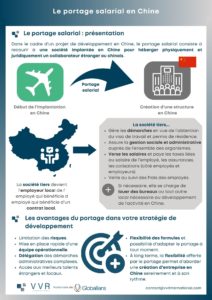Succeeding in China: Portage services to get started
Succeeding in China: Portage services to get started
The Chinese market offers enormous opportunities for foreign companies. However, setting up in China can be a major challenge, especially when it comes to the legal and administrative aspects. That’s where freelance administration comes in, as a flexible and effective solution to facilitate your entry or expansion into the Chinese market. In this article, we explore the keys to successful thanks to Portage services in China, to help you develop and sustain your local business with complete peace of mind. Business development – VVR International, strategic development, production, sourcing, distribution…
Understanding Portage and PEO services in China
Definition of Portage
Employee portage is a service that enables a company that does not have a legal entity in China to delegate the administrative management of its employees to a portage company. This system is particularly useful for foreign companies that are not yet fully established and wish to initiate or accelerate their development in China. VVR International will take care of the administrative, legal and physical (if necessary) hosting of your Chinese or foreign employee as part of its “portage salarial” services. .Recruitment & Portage – VVR International, strategic development, production, sourcing, distribution…
The legal context in China
China has its own employment laws and regulations, which can be complex. It is therefore crucial to work with a “portage” company that understands the Chinese legal framework and has all the necessary licences to offer this service legally in China. VVR International is the only European company with licences recognised by the Chinese authorities to recruit and manage employees throughout China.
Advantages and disadvantages
The benefits include flexibility, reduced administrative costs and legal compliance. However, it is essential to choose the right partner to avoid disadvantages such as hidden costs or compliance issues.
How to choose a freelance administration company in China
Selection criteria
When it comes to choosing a portage company, a number of criteria need to be taken into account. Among them, experience in the Chinese market, cost transparency and reputation are essential.
Questions to ask
Before committing yourself, ask specific questions about the services offered, proximity, charges, legality and how to cancel the contract. This will help you avoid unpleasant surprises.
Avoiding common pitfalls
Be wary of companies that promise “turnkey” solutions without providing details. Also beware of hidden charges and make sure you read the terms of the contract carefully.
Key steps to successful freelance administration in China
Planning and budget
The first step to successful freelance administration in China is careful planning. Draw up a realistic budget that takes into account not only direct costs, but also administrative costs and other unforeseen expenses. Define your objectives and establish an appropriate development strategy.
Human resources management
Effective human resources management is crucial. Make sure that the freelance administration company you choose offers human resources management services, such as recruitment, incubation, human resources monitoring and performance monitoring. Identifying your needs, selecting the right profile and then training them are decisive factors in the long-term success of your development project in China.
Monitoring and assessment
Finally, it is essential to put in place monitoring and evaluation mechanisms to measure the effectiveness of freelance administration. This will enable you to adjust your strategy accordingly.
Conclusion: Put the odds in your favour with VVR International
As you can see, portage is a fast, legal and effective solution for securing your new market in China. VVR International offers you a full range of services to help you set up successfully by supporting you at every stage of your project. From rapidly setting up an operational team to managing complex administrative procedures, VVR International is your partner of choice. Home – VVR International, strategic development, production, sourcing, distribution…
In addition to its portage and PEO services, VVR International can help you to recruit and manage your staff, while offering you suitable residential options thanks to its offices in four strategic areas in China. Their presence in France and China ensures that you receive quality support and assistance. Their presence in France and China guarantees you high-quality support and assistance.Areas of expertise – VVR International, strategic development, production, sourcing, distribution…
To find out more, we invite you to contact our experts for tailor-made support: Contact











